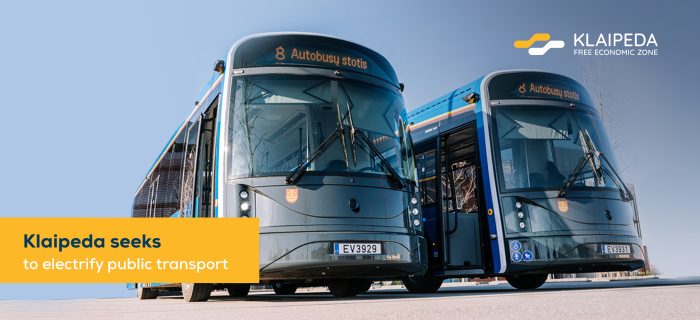News & Events
Watch our activity in one place
Klaipeda’s ambitions in the realm of electric public transport

Klaipeda’s vision for its public transportation is to have fast and electric busses rolling through the city’s main streets, allowing the citizens to comfortably save time, while also protecting the environment. Ten busses could hit the streets next year if the city council passes relevant legislation and takes care of the necessary bureaucratic procedures swiftly enough. There are plans to use EU aid to achieve this goal as well.
Vytautas Grubliauskas, the Mayor of Klaipeda, says that the city wants to step into this new stage of modern public transportation development. According to him, there are good chances of this goal becoming a reality, especially with Dancer, the developers and manufacturers of the internationally acclaimed electric bus of the same name, operating nearby, out of the Klaipeda FEZ. If that wasn’t enough, Dancer rolled out two of their electric busses, which stand out with their unique technical solutions, onto the city’s streets this spring.
“Klaipeda is proud of its quickly developing automotive industry and this is the answer we give to everyone who constantly asks why we only have two electric busses on our streets,” said the Mayor of the Klaipeda Municipality, Vytautas Grubliauskas.
Eimantas Kiudulas, the CEO of the Klaipeda FEZ, said that the city’s public transportation demands could be fully met by the Dancer electric busses, which are designed and manufactured in the city.
“The Klaipeda-made Dancer busses have great potential when it comes to exports,” said E. Kiudulas. “These busses are currently the ambassadors of our city’s innovative and talented people who work in the automotive industry to develop clean and sustainable transportation technology. The opportunity to expand its scope in the scenario of real traffic and transportation network would be a great impulse for Dancer to gain experience faster, which would allow the company to scale and conquer international markets.”
Soon, the Klaipeda Municipality will present a project for electric public transportation expansion for consideration and approval by the city’s politicians. If the plan gets enough votes, the next step will be looking for the necessary funding.
It has been calculated that it would take 33.5 million EUR to buy the required busses, perform the necessary street repairs, and install the traffic control system that would be needed by 2030. It is possible to get the majority of the funding from EU funds.
Contributing to Lithuanian CO2 emission obligations, Klaipeda passed a sustainable urban mobility plan in 2018, which outlines the progressive tools to improve sustainable mobility: improved public transportation attractiveness and speed, encouragement of movement by foot and bicycle, creation of an attractive and safe city environment.
“The study of prospective new means of public transportation in the city of Klaipeda” was ordered by the Klaipeda Municipality to evaluate the need for new modes of public transportation. It looked at renewing the current public transportation network and the related vehicle park by adopting high-speed electric busses.
Aiming to carry out its vision for electric transportation development, Klaipeda is planning to overhaul its street infrastructure by reconstructing the public bus lanes, bus stops, traffic signs, and turnaround spots. Additionally, there are plans to install a traffic control system, which would prioritize public transportation, as well as purchasing the electric busses. The lion’s share of the cost would go towards the busses. It has been calculated that it would cost over 20 million EUR. The plan for electric public transportation expansion involves purchasing 49 big electric busses from 2021 to 2030.
With that said, Klaipeda can still put forward a request for support in modernizing its public transportation system. If the request was granted, around half of the necessary funds for buying the electric busses and the required infrastructure would be covered by EU funds.
Citizens could like the new electric busses for several reasons, including reduced travel time, pricing, ecological concerns, and the level of comfort. In the end, however, the two critical problems the city hopes to solve are air pollution and the reduction of traffic jams.
